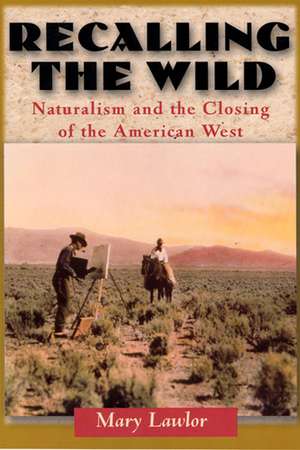Recalling the Wild: Naturalism and the Closing of the American West
Autor Mary Lawloren Limba Engleză Paperback – iun 2000
Ever since the first interactions between Europeans and Native Americans, the “West” has served as a site of complex geographical, social and cultural transformation. American literature is defined, in part, by the central symbols derived from these points of contact. By the end of the nineteenth century, the Western frontier was declared “closed,” a demise solidified by Frederick Jackson Turner’s influential essay “The Significance of the Frontier in American History (1893). At the same time, “naturalism” was popularized by the writings of Frank Norris, Stephen Crane, Jack London, Willa Cather, and the photographs of Edward Curtis. Though very different artists, they were united by their common attraction to the mythic American West.
As she investigates the interactions of representations of the West, Lawlor effortlessly melds literary studies, American studies, and history. She traces the cultural conception of the American West through its incarnations in the “westernism” of Daniel Boone and James Fenimore Cooper and the romanticism of the expansive frontier they helped formulate. Simultaneously, however, the influence of evolutionism and the styles of French naturalism began to challenge this romantic idiom. This naturalistic discourse constructed the West as a strictly material place, picturing a limited and often limiting geography that portrayed regional identity as the product of material “forces” rather than of individualistic enterprise.
With subtle, probing language, Lawlor explains how literary and artistic devices helped shape the idea of the American West and the changing landscape of the continent at the turn of the last century.
As she investigates the interactions of representations of the West, Lawlor effortlessly melds literary studies, American studies, and history. She traces the cultural conception of the American West through its incarnations in the “westernism” of Daniel Boone and James Fenimore Cooper and the romanticism of the expansive frontier they helped formulate. Simultaneously, however, the influence of evolutionism and the styles of French naturalism began to challenge this romantic idiom. This naturalistic discourse constructed the West as a strictly material place, picturing a limited and often limiting geography that portrayed regional identity as the product of material “forces” rather than of individualistic enterprise.
With subtle, probing language, Lawlor explains how literary and artistic devices helped shape the idea of the American West and the changing landscape of the continent at the turn of the last century.
Preț: 179.50 lei
Preț vechi: 206.59 lei
-13% Nou
Puncte Express: 269
Preț estimativ în valută:
34.35€ • 36.73$ • 28.64£
34.35€ • 36.73$ • 28.64£
Carte indisponibilă temporar
Doresc să fiu notificat când acest titlu va fi disponibil:
Se trimite...
Preluare comenzi: 021 569.72.76
Specificații
ISBN-13: 9780813528304
ISBN-10: 0813528305
Pagini: 240
Dimensiuni: 152 x 229 x 15 mm
Greutate: 0.4 kg
Ediția:None
Editura: Rutgers University Press
Colecția Rutgers University Press
ISBN-10: 0813528305
Pagini: 240
Dimensiuni: 152 x 229 x 15 mm
Greutate: 0.4 kg
Ediția:None
Editura: Rutgers University Press
Colecția Rutgers University Press
Cuprins
Preface
Introduction
Romantic Westernism and the Example of Daniel Boone
Scenes of Visionary Enchantment: The Lewis and Clark Narratives and the Leatherstocking Novels
Frederick Jackson Turner, Edward S. Curtis, and the Romance of Disappearing
Importing Naturalism to the American West
Frank Norris and the Fiction of the Lost West
Jack London and the Politics of Evolution
Stephen Crane's Literary Tourism
Willa Cather and the Enchantment of Difference
The Strangeness of Closure
Notes
Index
Introduction
Romantic Westernism and the Example of Daniel Boone
Scenes of Visionary Enchantment: The Lewis and Clark Narratives and the Leatherstocking Novels
Frederick Jackson Turner, Edward S. Curtis, and the Romance of Disappearing
Importing Naturalism to the American West
Frank Norris and the Fiction of the Lost West
Jack London and the Politics of Evolution
Stephen Crane's Literary Tourism
Willa Cather and the Enchantment of Difference
The Strangeness of Closure
Notes
Index
Recenzii
Lawlor focuses on the naturalists and how their work reflected and magnified the closure of the U.S., spiritually as well as geographically. In individual chapters on Frank Norris, Jack London, Stephen Crane, and Willa Cather, Lawlor details how these writersÆ literary visions reflect the U.S.Æs loss of freedom and the consequent rise of social constraints, urbanization, and banal existence. . . . A vital and useful re-evaluation of that period of U.s. literature.
These successes are weighed down by the ambiguous way in which the two major themes of the book are tied together. In short, while the attempt to synthesize the discussion of the West is admirable, it is difficult to provide a suitable review of the topics Lawlor considers, and to link these topics together.
Mary LawlorÆs Recalling the Wild is an extraordinarily bold and original contribution to the study of nineteenth-century American literature and culture. It will surely become an important and influential text both in its field and in the wider discourse of cultural studies at large.
Descriere
Ever since the first interactions between Europeans and Native Americans, the “West” has served as a site of complex geographical, social and cultural transformation. American literature is defined, in part, by the central symbols derived from these points of contact. By the end of the nineteenth century, the Western frontier was declared “closed,” a demise solidified by Frederick Jackson Turner’s influential essay “The Significance of the Frontier in American History (1893). At the same time, “naturalism” was popularized by the writings of Frank Norris, Stephen Crane, Jack London, Willa Cather, and the photographs of Edward Curtis. Though very different artists, they were united by their common attraction to the mythic American West.
